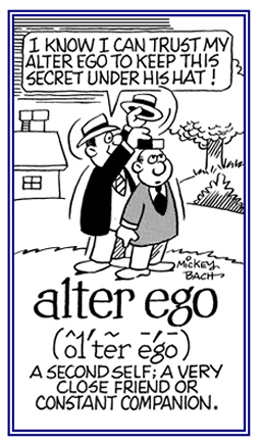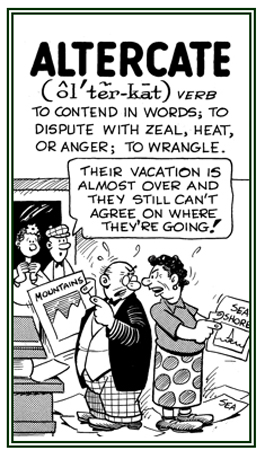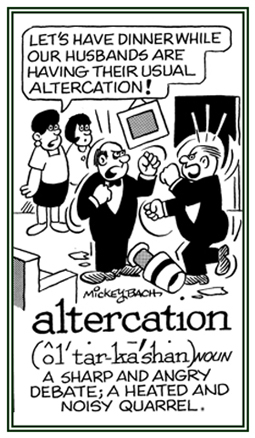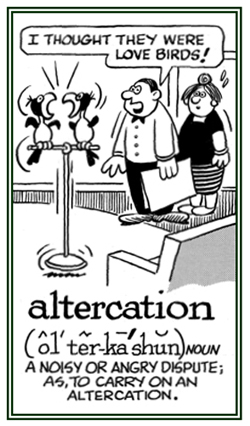alter-
(Latin: different, other, another; to change, to modify)
alter (ALW tur) (verb), alters; altered; altering
1. To change, transform, make different, amend, modify, or vary: The blonde wig completely altered Laura's appearance and she said that she would also alter her dress.
When the woman lost weight, she had all of her clothes altered to fit her new figure.
2. To spay or to perform a medical operation on an animal; such as, a cat or a dog: Ted's dog was taken to the vet to be altered so she couldn't have any puppies.
1. Another side of oneself; a second self; or another aspect of one's self: The characters "Dr. Jekyll" and "Mr. Hyde" were alter egos in a literary tale of horror.
2. A very close and trusted friend who seems almost a part of someone's self: Leonard and Lance grew up together in the same neighborhood, went to the same elementary school, the same high school, and seemed to be alter egos among their friends at the college they both attended.
3. A second self; a perfect substitute or deputy: Jim's assistant manager acts as his alter ego when he is not in the office.
4. Etymology: from Latin alter, "other" + ego, "I, self".

© ALL rights are reserved.
Go to this Word A Day Revisited Index
2. A very close and trusted friend who seems almost a part of someone's self: Leonard and Lance grew up together in the same neighborhood, went to the same elementary school, the same high school, and seemed to be alter egos among their friends at the college they both attended.
3. A second self; a perfect substitute or deputy: Jim's assistant manager acts as his alter ego when he is not in the office.
4. Etymology: from Latin alter, "other" + ego, "I, self".

Go to this Word A Day Revisited Index
so you can see more of Mickey Bach's cartoons.
Alter ipse amicus. (Latin statement)
Translation: "A friend is a second self."
alterable (adjective), more alterable, most alterable
1. A reference to something that can be changed or adjusted: The dress that Ingrid bought was too long, but alterable, so the seamstress hemmed it up to the right length.
2. A penalty which was ordered by court and capable of being modified into one less drastic: Jim was hoping for an alterable punishment by the court of justice that was less severe than the one decided on first.
2. A penalty which was ordered by court and capable of being modified into one less drastic: Jim was hoping for an alterable punishment by the court of justice that was less severe than the one decided on first.
1. The act or procedure of becoming different: Mary's mother made an alteration to her daughter's dress so it would fit properly.
2. A condition resulting from a modification: Since Lynn and her friend didn't have so much money, the made an alteration in their plans for the summer holiday, and stayed home instead of going on a cruise.
3. An event that occurs when something passes from one condition or phase to an another one: An occurrence is an alteration when something goes or proceeds from one situation to another.
2. A condition resulting from a modification: Since Lynn and her friend didn't have so much money, the made an alteration in their plans for the summer holiday, and stayed home instead of going on a cruise.
3. An event that occurs when something passes from one condition or phase to an another one: An occurrence is an alteration when something goes or proceeds from one situation to another.
alterative (adjective) (not comparable)
A reference to gradually changing, or tending to change: An alternative result of Jack's morbid health condition proceded slowly into one of normal health.
In medicine, historical: A medicine or treatment which gradually induces a change and restores healthy functions: The method of alterativeswas practiced in the 14th century, instead of doctors removing something from the body.
altercate (AL tuhr kayt") (verb), altercates; altercated; altercating
1. To conduct a heated argument; to argue intensely: Julia's two daughters altercated about who would sit in the front seat of the car on their way to go shopping with their mother, who decided to have both girls sit in the back!
2. Disagreeing about something: Greg’s parents were altercating about when it would be best to go on vacation, before or after Christmas.

© ALL rights are reserved.
Go to this Word A Day Revisited Index
2. Disagreeing about something: Greg’s parents were altercating about when it would be best to go on vacation, before or after Christmas.

Go to this Word A Day Revisited Index
so you can see more of Mickey Bach's cartoons.
1. A vehement, heated, or angry dispute: The two youths got into an altercation on the playground while they were playing soccer.
2. A noisy argument or controversy: The verbal altercation which Alex observed did not appear to be aggressive so he didn't try to intervene.
3. Etymology: from Latin altercari "to dispute (with another)"; from alter, "other".

© ALL rights are reserved.

© ALL rights are reserved.
Go to this Word A Day Revisited Index
2. A noisy argument or controversy: The verbal altercation which Alex observed did not appear to be aggressive so he didn't try to intervene.
3. Etymology: from Latin altercari "to dispute (with another)"; from alter, "other".


Go to this Word A Day Revisited Index
for a list of additional Mickey Bach illustrations.
A condition of the mind that differs from the normal state of consciousness: An altered state is typically one that is caused by drugs, hypnosis, or mental disorders.
An identification with people who have a similar personality to one's own: Mrs. Adams read about alteregoism as being the interest and sympathy for those who are in the same situation as, or are otherwise, similar to one's self.
Alteri, si tibi. (Latin phrase)
Translation: "To another, as if to thyself."
1. An adjustment of a garment so it will fit better: The altering of the sleeves of the coat took a while, but it was worth it!
2. A spaying or the sterilization of an animal; such as, a cat or a dog: Tom's two cats had an altering so they could not have kittens because it would be too difficult to find homes for them.
3. Something that has been changed by making it different; a transformation of someone or something: For the costume ball, the altering of Tom's face and hair made it impossible to recognize him!
2. A spaying or the sterilization of an animal; such as, a cat or a dog: Tom's two cats had an altering so they could not have kittens because it would be too difficult to find homes for them.
3. Something that has been changed by making it different; a transformation of someone or something: For the costume ball, the altering of Tom's face and hair made it impossible to recognize him!
A condition of being different than other people: The alterity of Virginia, from California, was quite noticeable when she taught students in a German school where all the other teachers were German.
1. One and then the other; every other, successive: Each of the two druggists works on alternate Sundays.
The awning had alternate red and white stripes.
2. A reference to a substitute or backup: If the main road is closed, Jim was told by his friend to take an alternate route when he comes to visit.
